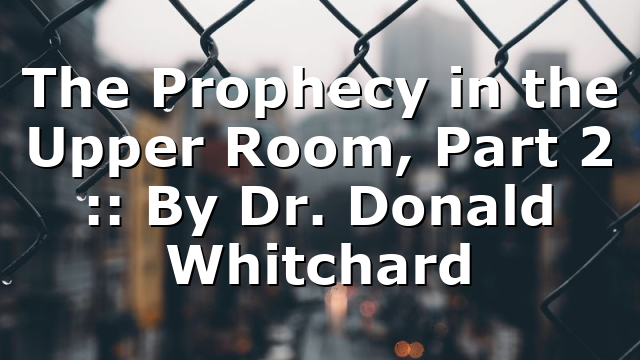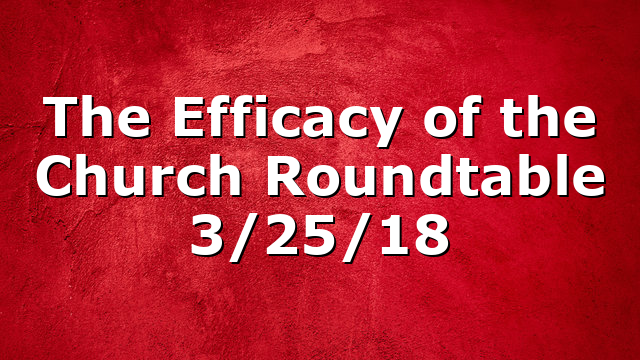
The Prophecy in the Upper Room, Part 2 :: By Dr. Donald Whitchard
John 14:1-3, Genesis 5:24, 2 Kings 2:11-12, Acts 1:9-11, Acts 8:25-40, 2 Corinthians 12:1-4, Revelation 4:2
Summary: The Lord Jesus gave a promise to His disciples and those who would come to Him for salvation that He would return for them (John 14:1-3). These verses are considered to be His teaching on the “Rapture.” Are we correct in this interpretation? We will look at the evidence.
On the night before He was to undergo the trial of the crucifixion and the redemptive work it ensued on behalf of fallen humanity, Jesus had given the disciples the assurance that even though He would soon leave them, He also promised that He would return and “receive you to Myself, that where I am, there you may be also” (v.3). He made the promise of returning from heaven to take believers there. It would seem, therefore, that the most logical and simplest explanation is that He was referring to an eschatological bodily return (Acts 1:11).
Though the disciples undoubtedly did not realize it at the time, Jesus was speaking of His return for them at the Rapture rather than His return at the Second Coming. In reading these verses, can we be certain that this interpretation is sound and based on evidence from not only Scripture but also from other men of God who have devoted themselves to the study and preaching of the Word? (Acts 17:11; 2 Timothy 2:15, 3:16, 4:1-5; 2Peter 1:19-21)
The first thing we need to examine is the origin of the word “rapture.” There are both skeptics and believers who will argue that the word is not in Scripture and, therefore, some kind of erroneous teaching. We need to do a word study in order to establish that this teaching is factual. The word “rapture” that we refer to in our English Bibles is derived from the original language in which the New Testament was written, that of “koine” Greek, the universal language of the Roman Empire. The word is “harpazo.” It means, “catch,” force,” “pluck,” “pull,” “snatch,” “take,” or “yank” in a rapid manner. (Source: An Expository Dictionary of New Testament Words by W.E. Vine, Chicago, Fleming H. Revell Publishers, 1966, p.299).
Jesus will come and suddenly ‘snatch away” His true church, taking us to His dwelling place for all time. He also referred to His return as being quicker than a flash of lightning (Matthew 24:27). Paul defined this “harpazo” as being quicker than an eye takes time to blink (1 Corinthians 15:51-52).
The second issue is whether any other event in Scripture apart from the obvious future tense described in John 14:1-3, 1 Corinthians 15:54, and 1 Thessalonians 4:13-18 can be found anywhere else. In looking at the rest of the New Testament, we see that the term “harpazo” is used a total of fourteen times (Matthew 11:12, 12:29, 13:19; John 6:15, 10:12, 28-29; Acts 8:39, 23:10; 2 Corinthians 12:2, 4; Jude 23; Revelation 12:5). There are two specific cases recorded in the Old Testament example that describe the process of being “snatched away,” known in the Hebrew as the word “laqach.” It applies to both the patriarch Enoch (Genesis 5:24) and the prophet Elijah (2 Kings 2:1-11).
Both of these men, each known for their godly nature, were received into God’s presence in their natural bodies. It may be that they are the two witnesses spoken of in Revelation 11 who are given miraculous powers to show the world the power and holiness of God. It should be noted that the two witnesses, after their execution by the Antichrist, will be raised back to life and taken in the air to heaven as a sign of God’s authority over the wicked world.
New Testament instances of the “harpazo” event apart from the future references are the Lord Jesus Himself at his Ascension (Acts 1:9-11); the evangelist (and probable apostle) Philip (Acts 8:25-40) when he encountered the Ethiopian official, leading him to faith in Christ; and Paul’s journey, where he was “caught up” to “the third heaven” (2 Corinthians 12:1-5), seeing things that were not to be mentioned, and was given an undescribed “thorn in the flesh” to keep him humble about the experience.
At the close of the first century, the last living apostle John was a prisoner on the penal island of Patmos, undergoing persecution for the sake of the Gospel. It was there that he received the “unveiling” (apocalypse) of Jesus Christ, who allowed him to “come up” to heaven (Revelation 4:1) in order to assure not only John but all believers then and now that He is in control of the events of the world, and that He is going to return in glory and majesty one day to rule over a new heaven and earth free from the curse of sin (Revelation 19:11-21, 21:1-7).
Let us now return to the original question of correctly interpreting John 14:1-3 as a reference to the “Rapture” by the Lord Jesus. I want to present a brief list of Bible teachers who believe that these words spoken by the Lord are the foundation for what He will do in the near future. The first of these is Dr. John MacArthur, whose works were mentioned in the previous sermon dealing with this topic. In his book One Perfect Life: The Complete Story of the Lord Jesus, he states that John 14:1-3 does indeed teach the Rapture event:
“His departure would be for their advantage since He was going away to prepare a heavenly home for them and will return to take them so that they may be with Him. This is one of the passages that refers to the rapture of the saints at the end of the age when Christ returns. The features in this description do not describe Christ coming to earth with His saints to establish His kingdom (Revelation 19:11-15) but taking believers from the earth to live in heaven. Since no judgment on the unsaved is described here, this is not the event of His return in glory and power to destroy the wicked (Matthew 13:36-43, 47-50). Rather, this describes His coming to gather His own who are alive and raise the bodies of those who have died to take them all to heaven.
After being raptured, the church will celebrate the marriage supper of the Lamb (Revelation 19:7-10), be rewarded (1 Corinthians 3:11-15, 4:5; 2 Corinthians 5:9-10), and later return to earth with Christ when He comes again to set up His kingdom (Revelation 19:11-20:6).” (MacArthur, John. One Perfect Life: The Complete Story of the Lord Jesus. Nashville, Thomas Nelson, Inc., 2012, p.412).
Charles Swindoll, in his ‘Insight” New Testament Commentary Series, writes the following:
“Jesus reassured His disciples that His going away had nothing to do with any of their personal failures, past or future. His purpose for going away was to secure their eternal future. His metaphor of home construction refers to His going to the cross on behalf of all humanity in order to secure eternal life for those who believe. He said that His leaving was necessary, and His return is assured. Jesus used the metaphor of an ‘abode’ to illustrate our future relationship with the Father. Jesus’ promise to ‘come again’ refers to both His resurrection and the rapture of the church in the end times.” (Swindoll, Charles R. Swindoll’s New Testament Insights: Insights on John. Grand Rapids, Zondervan Publishers, 2012, p.243).
William MacDonald writes in The Believer’s Bible Commentary (Thomas Nelson, 1989):
“John 14:3 refers to the time when the LORD will come back again into the air, when those who have died in faith will be raised, when the living will be changed, and when all the blood-bought throng will be taken home. This is a personal, literal coming of Christ. As surely as He went away, He will come again. His desire is to have His own with Him for eternity.” (p.1545)
This is only a small listing of the numerous material available both online and in print showing the promise of Jesus’ return, and I again encourage you to do your own research, as did the Bereans who examined even the teachings of Paul to see whether what he taught was of God according to the Scriptures (Acts 17:11).
Prophecy is not making a checklist of times, signs, and seasons in order to make an eschatological point or win an argument but is the complete and perfect fulfillment of the promises made by the Sovereign Lord God Almighty that in the end, Jesus wins, the devil loses, and a new world will emerge free from the curse of sin and death. Share that with someone who needs to know that this world is coming to a conclusion and heading for certain judgment and to look to Jesus Christ for salvation and true peace that this world cannot provide or promise.
We serve a victorious God, and He desires that all be saved. Let us get to work with the message of eternal life in Christ while there are still hours in the day.
————
Donald was born and reared in the authentic “Cajun Country” of southern Louisiana. He is a graduate of Louisiana College (B.A. in History Education/ Biblical Studies, 1984), New Orleans Baptist Theological Seminary (M.Div. In Christian Education, 1994), and Andersonville Baptist Seminary (Doctor of Ministry, Biblical Exposition, 2000). He has been in the Gospel ministry since 1986, serving as an evangelist, interim and supply pastor, hospital and rescue mission chaplain, high school and college teacher, and pastor in churches in Louisiana and Oklahoma.
In 2018 he began to devote his time to the rich field of internet and social media evangelism and outreach. In 2021 he became a member of the Oklahoma Conference of Southern Baptist Evangelists, using his skills as a writer to contribute articles and sermons to websites such as Rapture Ready, Sermon Central, and Inspirational Christian Blogs. He also writes Bible studies and curricula for churches in southeast and central Asia and Africa, the locations of which are anonymous. He can be contacted at: [email protected] for inquiries, information, and speaking/preaching engagements. His website is www.realitycityreverend.com. A copy of his resume is also available upon request.
The post The Prophecy in the Upper Room, Part 2 :: By Dr. Donald Whitchard appeared first on Rapture Ready.











Leave a Reply